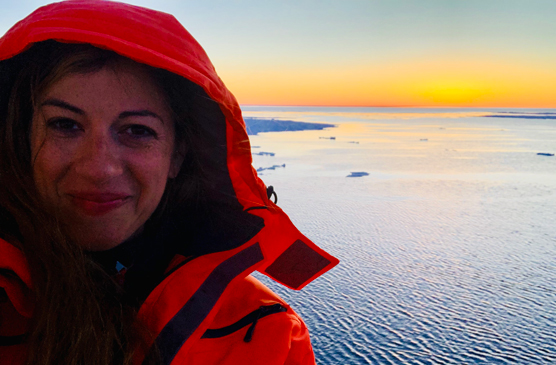Letizia Tedesco, a polar biological oceanographer at the Finnish Environment Institute, recently wrote a piece “Zooplankton dilemma in the twilight” for the News & Views section of the Nature Climate Change journal. She was invited to report and express her views on a scientific paper recently published in Nature Climate Change. The scientific paper by Hauke Flores and his team describes how the collection of a unique dataset in the high Arctic sheds light on the zooplankton vertical migration patterns at times of unprecedented sea-ice changes and signals potential disruptions to the Arctic ecosystem.
"As Arctic Sea ice continues to dramatically decline, more sunlight reaches deeper waters, and this impacts the bloom dynamics of both ice algae and phytoplankton. Zooplankton need to ascend to surface waters to feed on ice algae and phytoplankton, yet surfacing comes with high predatory risks. As a result, zooplankton ascend during darkness to avoid visual predators”, Tedesco explains.
“This vertical migration of zooplankton in seawater is one of the most extraordinary examples of synchronized animal movement on Earth. In polar oceans it has a clear seasonal migration pattern. During the polar day zooplankton stays deep and during the polar night it surfaces.”
In September 2020 Hauke Flores and his team deployed a new autonomous biophysical observatory into the Arctic Ocean. The observatory recorded, for the first time simultaneously, the vertical migration patterns of zooplankton and light transmission levels under drifting sea ice for a little more than six months and a thousand kilometers.
“The team found that zooplankton start ascending during autumn twilight following a certain light threshold. Then, the team applied this trigger level to a subset of climate models. They found that zooplankton would stay deeper up to one month longer in just about three decades from now”, Tedesco continues.
“This change would enhance the mismatch between the timing of primary and secondary production. It would lower the survival potential of zooplankton, and, consequently, of the keystone species Arctic cod, with direct repercussions on all the upper trophic levels.”
Ecological adjustments include possible regime shifts or collapses
Tedesco reminds, that all organisms have different degrees of plasticity and resilience to changes, together with a range of short-term acclimation and long-term adaptation patterns. “Thus, there is also more than one possible scenario. Zooplankton could shift to smaller-size species to avoid visual predators more successfully or could adjust their typical migration pattern or light trigger. Whatever happens, ecological adjustments include possible regime shifts or collapses”, she says.
“Future projects need to continue to focus particularly on those temporal and spatial scales that have been historically understudied, such as the twilight period in the high Arctic. In addition, future projections need to rely on robust models that describe light dynamics throughout all seasons and embed both the acclimation and the adaptation patterns that organisms can develop. Only then will we reduce uncertainties and produce more reliable future projections”, Letizia Tedesco concludes.
The Finnish Environment Institute has a nationally important role as a knowledge producer and expert in Polar environmental issues, and Arctic as well as Antarctic research are on the institute´s agenda. Both the Finland’s Strategy for Arctic Policy as well as the Finland’s Antarctic Research Strategy highlight the importance of Finland’s Arctic environmental expertise. When it comes to Arctic environmental research, the Finnish Environment Institute has been a hub and a long-term support institution for the Ministry of the Environment´s Arctic work. The Finnish Environment Institute´s expertise in Arctic environmental research is at the ministries’ disposal for policy formulation and support.
Letizia Tedesco works as a Senior research scientist at Finnish Environment Institute. She is a Finnish representative of the International Arctic Science Committee´s (IASC) Cryosphere working group, a member of the World Climate Research Programme (WCRP)'s Clivar/CliC Northern Oceans Region Panel and a chair of the Biogeochemical Exchange Processes at Sea-Ice Interfaces (BEPSII) working group.

Letizia Tedesco works as a Senior research scientist at Finnish Environment Institute. She is also a member in the International Arctic Science Committee (IASC) Cryosphere working group. © Letizia Tedesco
Further reading: